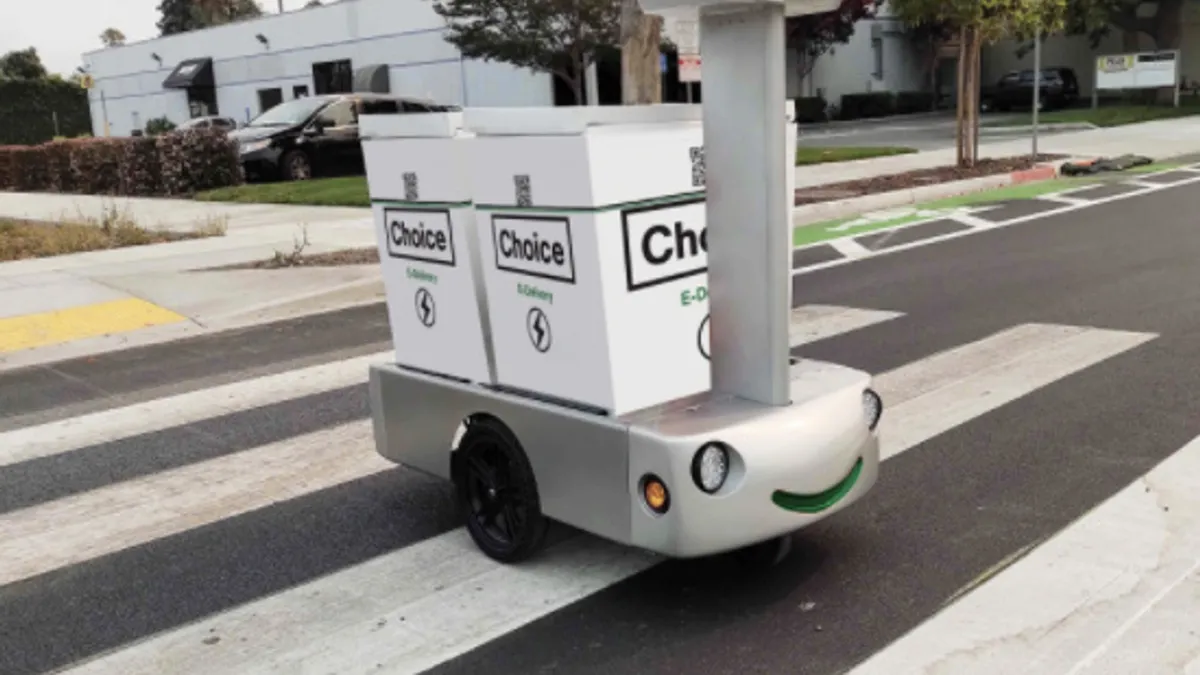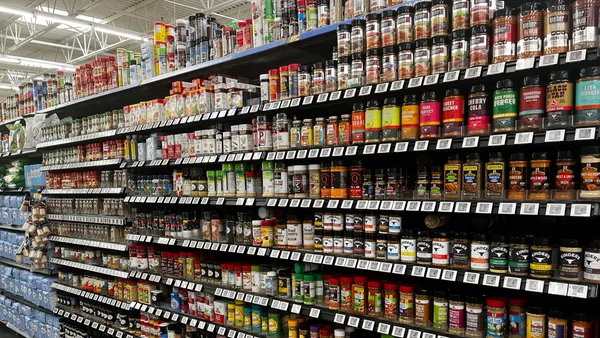Dive Brief:
- Choice Market plans to deploy a pair of remote-controlled electric vehicles from California startup Tortoise to move products between its stores and commissary as part of a test of the technology set to begin in October, according to officials of the companies.
- The vehicles, which can carry approximately 100 pounds of goods in insulated containers, will augment the conventionally powered truck Choice currently relies on to link its retail locations and food-preparation facility.
- Choice is looking to the emission-free vehicles to help further its sustainability goals and boost operational efficiency, and plans to use the technology to make deliveries to online customers in the future.
Dive Insight:
Choice's decision to pilot the remote-controlled delivery vehicles is connected with a larger effort by the technology-focused retailer to make better use of its employees' time by shifting them away from "non value-added activities," said CEO and founder Mike Fogarty.
With the labor market tight, Fogarty said it makes more sense to use automation whenever possible to run Choice, which currently operates three Denver-area stores and plans to add at least two more in 2022.
"It's not like our entire company will be run by robots, but we want to focus our time and energy on creating and cooking high-quality fresh, healthy and accessible food, and that's where our human capital will be deployed," Fogarty said in an interview, adding that the driver the company employs to pilot a conventionally powered truck between its locations will be reassigned if and when Choice is ready to switch entirely to Tortoise's carts.
In addition, Choice is looking to move away from reliance on human cashiers, and in April opened a store that features checkout-free shopping driven by computer vision technology from AiFi.
Tortoise and Choice elected to begin their partnership by focusing on deliveries between stores — known as the "middle mile" — to allow the companies to iron out potential issues with the vehicles before using them to serve customers, Dmitry Shevelenko, Tortoise's president and co-founder, said in an interview.
"The workflow is the same, but it's obviously a little easier with the middle mile" because Choice employees will be loading and unloading the vehicles, Shevelenko said. "You can just train a few folks once, and they'll know what to do, and you're doing the same routes again and again, which from an automation point of view is music to my ears because it means we're going to get super-efficient."
Last-mile deliveries, however, represent a much larger business opportunity for Tortoise given that retailers are likely to make more trips to consumers than between their own facilities, Shevelenko added.
The vehicles, which are operated by controllers in Mexico City, will initially move at about 2 mph as they move around Denver, Shevelenko said. Later, as drivers become more familiar with the routes, that speed will increase to an average of about 4 mph.
Choice and Tortoise expect to add additional Tortoise vehicles to serve e-commerce customers in the spring, after using the winter to ramp up their partnership, Shevelenko said. Choice currently relies on a Nissan Leaf electric car and an e-bicycle to make deliveries to customers, according to Fogarty.
In addition to Choice, Tortoise is testing its vehicles with Safeway under a partnership launched earlier this year that involves e-commerce deliveries from stores in Tracy and Windsor, California. Tortoise is also preparing to announce that ShopRite is piloting the vehicles, and is also in talks with other grocery chains interested in its technology, Shevelenko said.













